20th Sunday in Ordinary Times
Eccle. 3:17-20, 28-29; Ps. 64:4-7.10-11; Heb. 12:18-19.22-24; Gosp. of Luke 14:1.7-14
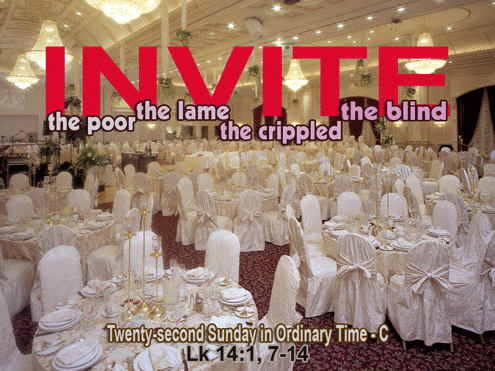
Preached by Msgr Philip Heng, SJ at Cathedral of Good Shepherd, Singapore on 1 september 2019
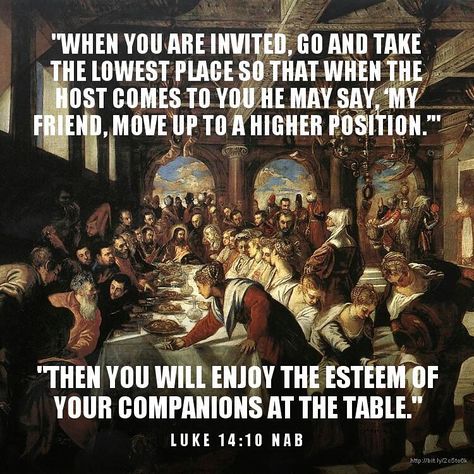 In today’s Gospel, Jesus’ parable on humility and hospitality, has two distinct, but inseparable parts. In the first part of the parable Jesus was addressing the guests of what seems to be a grand dinner reception, as the meal was held at the house of one of the leading Pharisee. In the second part of the parable, Jesus was addressing the host of the event.
In today’s Gospel, Jesus’ parable on humility and hospitality, has two distinct, but inseparable parts. In the first part of the parable Jesus was addressing the guests of what seems to be a grand dinner reception, as the meal was held at the house of one of the leading Pharisee. In the second part of the parable, Jesus was addressing the host of the event.
As in the time of the Jews and even now, meals are very important social gatherings. We also know that in formal state functions and wedding dinners, who sits at the VVIP or who sits closest to the Guest of honour, like the PM, or whose tables are closer to the VVIP table have important significance in the event and to the host. I grew up in a big family of ten, and during lunch and dinner of our family, everyone knew that my father would sit at the head of the table, and beside him, on his right was my mom; the rest of us in the family could sit anywhere we wished as there was less significance.
In the Jewish culture too, such social norms were observed; perhaps, even more strictly. In today’s Gospel episode when Jesus who was invited of a dinner reception, he noticed that “people picked places of honour.” So, Jesus took the opportunity to proclaim that the guests who picked places of honour may find themselves greatly embarrassed by the host, if he were to be asked to give up his seat for someone more important, and then to take the lowest seat. Jesus then advised, “For everyone who exalts himself will be humbled, and the man who humbles himself will be exalted.”
There is the story of a young woman asked to see his priest, as she is often troubled and distracted at Mass. When she eventually met the priest, she said, “Father, I have become aware of a sin in my life which I cannot control. Every time I am in church, I tend to look around and I realize that I am the most beautiful woman in the whole congregation. Clearly, this great gift of beauty that I have is preventing me from focusing on the Mass, so Father, what can I do about this sin?” The priest paused for a moment, looked at her and replied, “No worries Jane, it is not a sin. It is just a mistake!”
 Sir Winston Churchill, a British statesman, orator, author and the prime minister who rallied the British people during World War II, and led his country from the brink of defeat to victory was once asked, “Doesn’t it thrill you to know that every time you make a speech, the hall is packed to overflowing?” Sir Winston replied, “Yes, it’s quite flattering. However, whenever I feel that way, I always remind myself that, if instead of making a political speech, I was being hanged, the crowd would be twice as big.”
Sir Winston Churchill, a British statesman, orator, author and the prime minister who rallied the British people during World War II, and led his country from the brink of defeat to victory was once asked, “Doesn’t it thrill you to know that every time you make a speech, the hall is packed to overflowing?” Sir Winston replied, “Yes, it’s quite flattering. However, whenever I feel that way, I always remind myself that, if instead of making a political speech, I was being hanged, the crowd would be twice as big.”
My brothers and sisters in Christ, there is a wise saying that “honour” is not gained by seizing prominence; it must be given by others. Scripture scholars tell us that Jesus was not merely giving good advice or teaching the Pharisees to be more prudent and effective in gaining public honour. No, Jesus was referring to a truth that is deeper than social recognition. Jesus was advising the guests not only to take a few steps below their social position, but to take the “last and the lowest” of all places.
By this advice, Jesus was challenging the guests to be aware of the greater and deeper truth that “honour”, or “doxa” (Gk) which is translated to mean “glory,” comes from God and only God can give.
In other words, Jesus is saying to the Pharisees and also to you and me, that social and secular recognition of our status and prominence are valid. /However, what is of greater and of ultimate importance in our lives is what God thinks of us and sees in our hearts. This is because our social status and recognition, regardless of how great our achievements may be, in society or even in the history of humankind, they are all passing. One day, you and I will have to die; when this will happen nobody knows; for some of us this could be 50 years more, others 5 years, still others 5 weeks, 5 days or even within the next 5 hours, before we die.
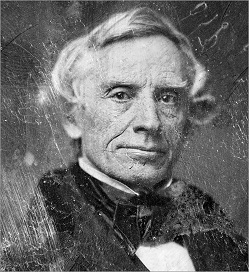 And so, what we live for daily must be related to and be built on the foundation of our love and relationship with God. And, only when we live for God and because of God and out of love for God can we say that we are living a much more meaningful and fulfilling life than trying so hard to achieve the successes and social recognition of the secular world. And, all of us know that what I have just affirmed of Jesus’ Gospel invitation and challenge to us today, is true.
And so, what we live for daily must be related to and be built on the foundation of our love and relationship with God. And, only when we live for God and because of God and out of love for God can we say that we are living a much more meaningful and fulfilling life than trying so hard to achieve the successes and social recognition of the secular world. And, all of us know that what I have just affirmed of Jesus’ Gospel invitation and challenge to us today, is true.
There is the story of the famous inventor Samuel Morse who was once asked, if he ever encountered situations where he didn’t know what to do. Morse responded, “yes, all the time; whenever I could not see my way clearly, I knelt down and prayed to God for light and understanding.” Morse received many honours from his invention of the telegraph, but felt undeserving. He said, “I have made a valuable application of electricity not because I was superior to other men, but solely because God, who meant it for mankind, must reveal it to someone and He was pleased to reveal it to me.”
My sisters and brothers in Christ, in Samuel Moss’s humility he was able to affirm the reality that it is God who has given him all his successes and made his great inventions possible. Clearly Samuel Moss is a man of peace his heart is one that is filled with gratitude to God.
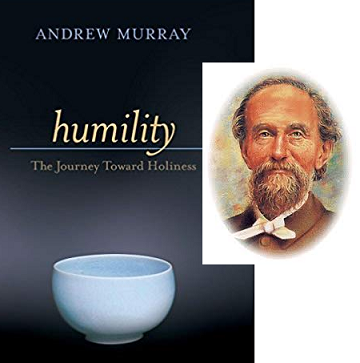 Andy Murray, a renowned write of more than 250 books, and a Christian pastor goes further to say, “The humble man feels no jealousy or envy. He can praise God when others are preferred and blessed before him. He can bear to hear others praised while he is forgotten because … he has received the spirit of Jesus, who pleased not Himself, and who sought not His own honour. Therefore, in putting on the Lord Jesus Christ he has put on the heart of compassion, kindness, meekness, longsuffering, and humility.”
Andy Murray, a renowned write of more than 250 books, and a Christian pastor goes further to say, “The humble man feels no jealousy or envy. He can praise God when others are preferred and blessed before him. He can bear to hear others praised while he is forgotten because … he has received the spirit of Jesus, who pleased not Himself, and who sought not His own honour. Therefore, in putting on the Lord Jesus Christ he has put on the heart of compassion, kindness, meekness, longsuffering, and humility.”
My sisters and brothers in Christ, to have humility in our heart is to have Jesus at the centre of our hearts. And if Jesus is at the centre of our hearts, then we will surely have the gift of a freedom, to transcend all our emotional entanglements and conflicts, and to live in peace with ourselves and with others.
And we can see that with such a gift of humility, there is no compulsion to compete for affirmation, attention and adulation, and the places of honour at social events; whether formal or otherwise. For this Andy too concurs that to have the gift of humility, “is to be at rest when nobody praises me or even when I am blamed or despised. It is to have a blessed home in the Lord where I can go in and shut the door and kneel to my Father in heaven in secret and then be at a peace; a peace that is as in a deep sea of calmness when all around is trouble.”
In other words, my brothers and sisters in Christ, the deep peace that come from the true humility of heart, can only come to us, if we love God of Father wholeheartedly, and follow the wisdom of Jesus and draw strength from Him who has shown us how to love God our Father unconditionally. Humility is striving to become more like Jesus in our daily living; the strive to live the selfless love of Jesus, even as we acknowledge that we are each still weak, changeable and sinful.
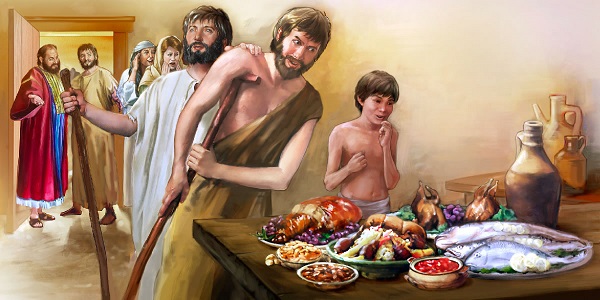 My brothers and sisters in Christ, in the second part of today’s parable, as mentioned, Jesus was addressing the host of the dinner reception. We heard proclaimed that Jesus was advising the host not to invite guests who can reply them, like their “friends, brothers, relations or rich neighbours, and indeed people in high positions and power and wealth.
My brothers and sisters in Christ, in the second part of today’s parable, as mentioned, Jesus was addressing the host of the dinner reception. We heard proclaimed that Jesus was advising the host not to invite guests who can reply them, like their “friends, brothers, relations or rich neighbours, and indeed people in high positions and power and wealth.
To understand this proclamation of Jesus, let us note that Jesus was proclaiming a reality that is deeper than the social norms. Jesus was reminding and pointing out to the leading Pharisees that in the Kingdom of God, God our Father treats everyone as equal – all the poor, the needy, the crippled, the lame, the blind, and those who are rejected by our secular society. In the eyes of God, every person is treated with equal dignity.
And so, Jesus is calling you and me today, to witness to the Kingdom of God by inviting these poor and the needy, and the marginalised, who have no means to repay us. And, to this Jesus adds, “that these poor cannot repay you back means that you are fortunate, because (His Father in heaven) will “repay you when the virtuous rise again,” which is in heaven, and at the end of time.
My brothers and sisters in Christ, this means that when we are to witness to the Gospel of Christ, our witness must be a witness of inclusiveness where there is the equality and dignity of every person, which comes from God, when he created us in His image and Likeness. In other words, the human dignity that we and every person has is not based on how wealthy, powerful and positioned we are in society, but as God’s sons and daughters. Jesus then assures us, in today’s Gospel, that when we to witness of God’s Kingdom with such inclusiveness, then God will honour and praise us and bless us. And, such honour and praise and blessings, will last for all eternity, and they are far more important than the honour and praise of the secular and social world.
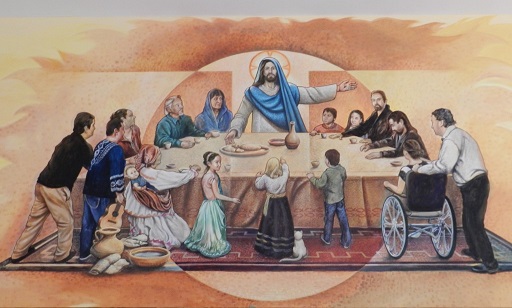 My sisters and brothers in Christ, as I conclude, let us remind ourselves that in today’s Gospel, Jesus proclaims, “For everyone who exalts himself will be humbled, and the man who humbles himself will be exalted.”
My sisters and brothers in Christ, as I conclude, let us remind ourselves that in today’s Gospel, Jesus proclaims, “For everyone who exalts himself will be humbled, and the man who humbles himself will be exalted.”
Perhaps, one way to sum this up is to affirm that a truly great man is his humility. This is because such a person feels and knows and believes that true greatness is not what we have achieved for ourselves in the secular and materialistic world, but how much have we loved, honoured, praised and served God through our daily living. True Greatness is knowing that God is Great and we are mere creatures; we cannot do anything except through God’s power, Light and Love. It is with such humility that we will be exalted, praised and blessed by God.
And when Jesus reminded the host of the dinner reception about focusing their life on witnessing to the Kingdom of God through treating and respecting the poor, the needy, the crippled, the lame and the blind, with respect, dignity and equality, we can also say that Jesus is also inviting you and I to become a truly wise person; a person who can from today, transcend and go beyond all earthly gains and glory, and instead focus on building our lives on praising, reverencing and serving God in all situations, with all persons and in all things.
Adapted from; Tim Hansel, Eating Problems for Breakfast, Word Publishing, 1988, pp. 33-34.
Norman McGowan, My Years With Winston Churchill, Souvenir Press, London.
The New Interpreter’s Bible; A Commentary in twelve volumes; vol. IX, the Gospel of Luke and John; pub. Abingdon Press; Nashville; 1995; pp 286-287.
Msgr Philip Heng, S.J.

homepage zähler hits as at 2nd September 2019
